A pair of election reform bills supported by Campaign Legal Center will reach a significant milestone today in Sacramento. The California State Assembly’s Committee on Elections and Redistricting will vote on SB 1107 (Allen) and SB 1349 (Hertzberg). These two bills, which already passed the State Senate late last month, must pass this committee as well as the Assembly Appropriations Committee before receiving a vote from the full Assembly.
In a time when many states have imposed new restrictions making it harder to vote, harder to track money in politics, and harder to run a clean campaign, California has moved in the other direction, enacting automatic and same-day voter registration and strengthening disclosure requirements. These two bills will continue that progress and improve citizens’ ability to engage in the democratic process.
SB 1107 would permit public financing and restore balance in our democratic system
In 1988, anti-reform groups placed Proposition 73 on a crowded, low-turnout June primary ballot. Prop 73 banned the state, counties, cities, and local districts from publicly financing elections throughout California.
However, a popular appetite for public financing has become more and more apparent. Six charter cities in California (which are exempt from the ban), including Los Angeles, Long Beach, and San Francisco, have passed public financing programs. Berkeley hopes to become the seventh with CLC’s help. Sacramento County voters attempted to implement public financing, but it was struck down because of Prop 73. And polls show high levels of voter support for these proposals
SB 1107 would lift the Prop 73 ban, permitting the state and local governments to establish public financing for their elections. Public financing programs encourage candidates to rely on a broader coalition of low-dollar contributors, rather than a smaller number of wealthy donors, and there is evidence that they make elections more competitive and the types of candidates and contributors more diverse and engaged.
The bill would permit voluntary public financing programs when they include requirements to determine qualified candidates and participating candidates are treated equally. The bill provides that it would be submitted to the voters for their approval before it is enacted. However, given the success of local public financing programs, as well as the exponential growth of money in politics over the last 28 years, this effort would likely be welcomed by California voters.
The bill also includes a number of additional pro-democracy and transparency measures. It would require an officeholder who has been convicted of a felony to forfeit any campaign committee funds within his or her control, other than those required to pay outstanding debts or to return contributions. Additionally, the bill would impose a ban on campaign contributions from foreign sources to candidates and raise penalties on foreign individuals or groups who violate state money-in-politics laws. Foreign contributions to candidates are already illegal under federal law, but because the FEC often deadlocks and fails to enforce the law, SB 1107 would allow the state to act where the federal government can or will not.
SB 1107 passed the Senate by a vote of 26-12 on May 31. Once it has been approved by the Assembly Elections Committee, it must pass the Assembly Appropriations Committee and a full Assembly vote before proceeding to the Governor’s desk. If it is amended in the interim, it will also need to return for a second vote in the Senate.
SB 1349 would give Cal-Access – and transparency – a desperately needed upgrade
California is rightfully known as the tech hub of the United States. But the state’s infamous campaign finance database, Cal-Access, is about as far from Silicon Valley as it gets. The database contains information on contributions made to candidate, party and ballot initiative committees and money spent by these committees, as well as payments for lobbying.
SB 1349 would improve Cal-Access, giving voters and media organizations more accurate and better-organized information about who is donating to candidates for office and paying for lobbyists.
A 2015 Sacramento Bee article noted that there was “broad consensus that Cal-Access is too difficult to be useful,” describing it as an “information labyrinth” and “the worst government website in the country.” Voters in the state that gave the world Apple and Google have to navigate an error- and crash-prone website designed in the late 90s and can’t even download a spreadsheet listing contributors to a political campaign. This outdated website is a major obstacle to transparency.
There is virtually unanimous recognition of the need to rebuild Cal-Access. SB 1349 would modernize Cal-Access and require it to be easily and publicly searchable and its data downloadable. It would also make it easier for campaigns to comply with funding and disclosure laws by allowing them to file completely online. Meanwhile, the Legislature’s Budget Committees seem prepared to spend $1.8 million to implement the bill, though a final vote on next year’s budget has yet to occur.
In the absence of an operational campaign finance database, non-profits and journalists have attempted to fill in the gaps. But that has not been enough. SB 1349 shows a real commitment to fixing Cal-Access so that the public can easily determine who pays for the campaigns of its elected officials.
SB 1349 also passed the Senate on May 31, by a vote of 38-0.
Together, these bills would make California’s government more democratic and accessible. With the passage of SB 1349, Californians will be able to receive helpful, understandable information on who is funding campaigns. And if they get tired of seeing the usual list of big money donors funding state or local politics, SB 1107 would allow them to adopt public financing to clean up their elections.
Thomas Hughes is a summer legal intern with the Campaign Legal Center and is a rising 2L at Harvard Law School.
